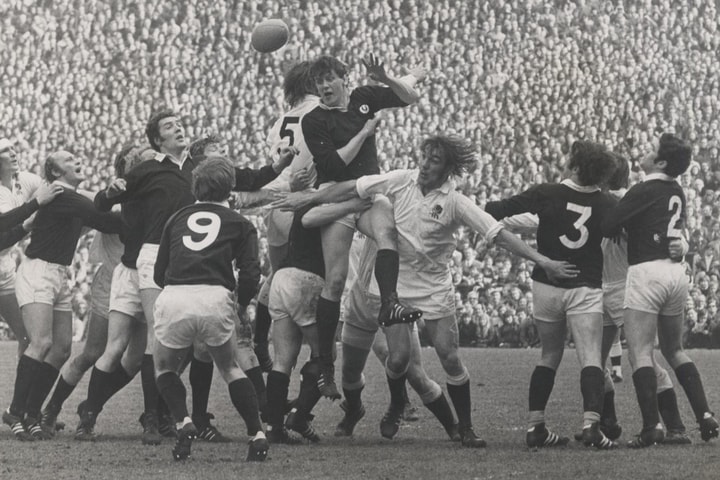
05 November 2025

Some sporting occasions remain etched in your memory for ever and can be recalled at will.
Such a one is a moment in the gathering gloom at a packed Murrayfield on a cold and damp afternoon in December 1978 with a valiant Scottish team 9-12 in arrears. After the Scottish pack had driven upfield to their opponent's 22 metre line in the 77th minute of the match, the ball was passed back to their fly half and captain Ian McGeechan. He had already kicked one drop goal and, if he could land a second one, it was likely that the match would end in a draw and the 8th All Blacks would be deprived of their much sought first Grand Slam over the four home nations on a full tour of the United Kingdom. The 2nd All Blacks in 1924-25 had been unbeaten in 30-matches in the UK and France but had not played Scotland on that tour.

New Zealand team to UK, 1978
The All Blacks and their 26-year old captain the wing forward Graham Mourie had certainly ridden their luck to be in sight of a grand slam of international match victories on their 1978 tour. They had beaten Ireland narrowly 10-6 in Dublin on November 4th scoring the only try of the match from their hooker Andy Dalton in the 76th minute after losing to Munster earlier in the week in what turned out to be their only defeat of the tour.
After a furiously contested line-out penalty award in favour of the All Blacks against Wales in Cardiff a week later, their full back Brian McKechnie, an international cricketer and replacement in this match after Clive Currie broke his jaw in the fifth minute, had then kicked his third penalty from thirty seven metres to give the All Blacks a 13-12 victory with two minutes of the match remaining. Poor Clive Currie was out of the tour and never played another match for the All Blacks, but his replacement was the hero of the hour.
Only England had presented less of a challenge in the third international of the tour on November 25th. They were well beaten 16-6 through an efficient rather than inspired display by the All Blacks at Twickenham. Both tries came from English line-out errors, so it was an unchanged All Black side that was chosen to face Scotland on December 9th. Scotland chose three new caps, but their side contained eight experienced players from clubs in the Scottish borders and an impressive backline with charismatic full back Andy Irvine alongside fellow British and Irish Lions Ian McGeechan and Bruce Hay.
In under ten minutes Scotland opened their account with a kick and chase try scored by Bruce Hay on the left wing after the All Blacks had failed to clear their lines. It was the only try the All Blacks conceded in their four internationals and set the tone for an extraordinary afternoon. The conditions were extremely poor on a rain-soaked pitch and there were handling errors aplenty. Irvine converted the try but the All Blacks came back into the match and led by 9-6 at half-time. They extended their lead to six points when McKechnie kicked his second penalty but McGeechan soon kicked his drop goal to cut the All Blacks' lead to three points with sixteen minutes of the match remaining.
It was "nip and tuck" as Bill McLaren would have, or maybe did, say for the next thirteen minutes until McGeechan aimed for his second drop goal to bring the scores level. But in filthy conditions he was unable to secure the necessary elevation and his kick was charged down by his opposite number, most capped Canterbury fly half Doug Bruce. The ball fell loose and was hacked upfield by the centre Bill Osborne. The Scottish backs were in disarray as they had all come up to push for what they hoped might be a decisive score. As the ball ran loose around halfway, Osborne's fellow centre, Bruce Robertson sped up like the wind and hacked the ball on. Showing remarkable control, one further kick took the ball into the Scottish in-goal area and Robertson dived on it to secure the try and New Zealand's much coveted Grand Slam.
McKechnie converted the try and, although Scotland mounted a further spirited attack in the closing minutes, it was actually the All Blacks who managed to "score" another try in injury time through their wing forward Leicester Rutledge after another long-range breakout. Rutledge clearly touched down in the last move of the game but, in the gloom, the referee apologised for being unsighted and so did not award the score. If you had been in the crowd on the other side of the pitch, you would not have seen it either!
Sources:
About the Author - A professional musician and arts administrator, Richard Steele has had a life-long love of sport. He has been on the committee of the World Rugby Museum at Twickenham since 2005.
Visit our website, book your visit and follow us on Facebook, Twitter and Instagram.